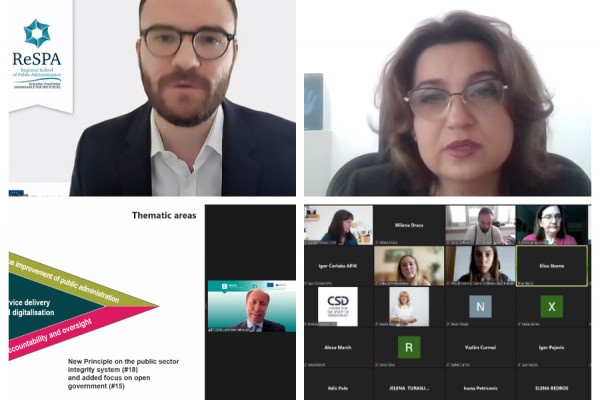
Joint webinar of ReSPA, RAI and SELDI on “Promoting Public Administration Integrity via Regional Cooperation” Shed Light on the Coherent and Comprehensive Public Sector Integrity Systems as Critical Principles of PAR
30 June 2023, online
Today 50+ public servants, practitioners, anti-corruption agencies, renowned experts and speakers, and schools/academies of public administration engaged in an expert discussion on the challenges faced for improving governance and the promotion of transparent, accountable and ethical public services, focusing on corruption prevention and learning tools developed by RAI, SELDI, the SIGMA/OECD, and the efforts made by the ReSPA to strengthen the competences for the integrity of public servants.
Gentian Xhaxhiu, ReSPA Programme Coordinator underlined at the opening the importance of integrity as a critical topic that can even reshape the future of governance. Xhaxhiu presented core ReSPA’s priorities where “integrity and transparency have been seen as horizontal ones in all reform agendas”, reminding participants of the EC Enlargement Methodology which calls the Western Balkans “to deliver credibly on 4 key areas (rule of law, fighting corruption, ensuring the proper functioning of democratic institutions and public administration, and foreign policy alignment). Today’s webinar tackles almost half of those areas where integrity and transparency are prerogatives for democratic institutions. Cooperation among Western Balkan administrations can help develop comprehensive strategies that address transparency and integrity,” said Xhaxhiu. He also linked ReSPA’s capacity-building activities with transparency and integrity equipping public servants with knowledge and ethical values and called the teams dealing with integrity, transparency and anti-corruption to use ReSPA’s instruments that can facilitate the transfer of expertise and culture of integrity such as mobility schemes, on-demand support and peer-to-peer visits.
Daniela Mineva, Senior Analyst at the Center for the Study of Democracy, underlined that civil society organizations want to support and suggest anti-corruption measures to be more effective, not to be a criticizer but partners for the governments in fighting corruption. “We need systemic anti-corruption tools and we believe the most strategies already exist on paper and now is time to apply them in practice and here the governments can count on our strong support”, underlined Mineva.
Desislava Gotskova, Head of Secretariat, Regional Anti-corruption Initiative, called for “joint activities and partnerships in keeping together key stakeholders from the region in implementing anti-corruption measures which are prerogative for building transparent governments”.
Prominent experts tackled important topics under integrity and transparency. Alongside Lech Marcinkowski, Senior Policy Adviser, OECD/SIGMAs who presented the revised Principles of public administration focusing on integrity principles, Nedim Hogic, Research Fellow, New York University, presented the latest findings and improvements in the transparency of the governments in the Western Balkans and introduced the Transparency Index for the WB. Marko Skerović, Senior Advisor in the Section for Integrity and Lobbying, Agency for the Prevention of Corruption, Podgorica underlined the importance of collaboration between CSOs and international organizations with government bodies in developing a legal framework, methodology and concrete measures for fighting corruption in Montenegro.
Vladimir Georgiev, Member of the State Commission for the Prevention of Corruption, Skopje reflected on the state of play in North Macedonia where the cooperation between governmental bodies and other institutions and CSOs is also crucial.
In partnership and coordination with other important regional players, ReSPA commits to strengthen its portfolio of capacity building targeting ethics, integrity and transparency in the public sector.



